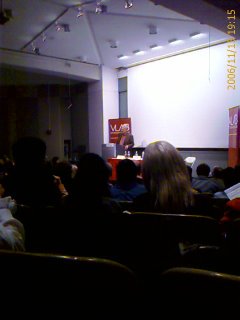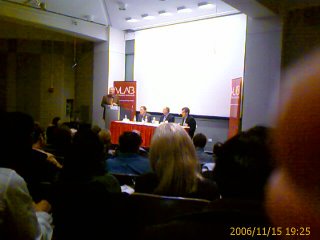 [Following are my unedited notes from the Nov15 Moore MIT/Stanford VLAB event. Will edit shortly]
[Following are my unedited notes from the Nov15 Moore MIT/Stanford VLAB event. Will edit shortly]Palo Alto Wednesday November 15, 2006: The MIT/Stanford Venture Lab (VLAB) hosted a special evening with the acclaimed author and venture capitalists Geoffrey Moore and three veteran CEOs from online security and communication management companies (Barracuda Networks, Postini, and Proofpoint) who explored what it takes for businesses to thrive in this highly competitive global marketplace.
Geoffrey, whose books include crossing the Chasm, Dealing with Darwin, and Inside the Tornado, explored insights on the latest developments in the online security space., revenue generation, viral marketing, business model strategies, and other issues critical to the survival of startups.
In his keynote address Geoffrey went through a brief history of entrepreneurship and Venture Capitalist activities in the valley since before the 90's. He mentioned that when he first wrote "Crossing the Chasm" most of the entrepreneurs in the valley where former corporate guys. These were the initial pioneers whom were responsible for the first Tech boom. They were the founders of the likes of Intel, Fairchild Semiconductor, AMD, etc.
The mid-90's saw a second group of Entrepreneurs who came out of the Ivy league educational institutions such as Stanford, MIT, Berkeley, etc. These were "wicked smart people with an exceptionally higher IQ than their predecessors." This group of entrepreneurs set the 'Geek' trend. They were not business people, their motivation was to develop cool stuff. What they needed were business and finance people to help build business models around their "cool geek like" ideas.
Following this group we saw the dot.com era. As most remember it was boom time in the valley. The Valley was littered with dot.com's, it was the in thing then.
We are now back to an era where we need to build "real companies, not so much the picksey dust companies of the dot.com era." We need to build "earnest and thoughtful" companies.
These days to startup a "digital life" sort of venture one doesn't need much capital, and thus there is little impetus to approach VC's. Bootstrapping is the name of the game in this space, as costs are relatively low.
Traditionally VC's have invested in B2B and B2C companies. The Web x.0, or "Digital Life companies" started in kitchens or people garages. VC's weren't interested in such ventures.
 Immediately following is keynote, Mr Moore asked each panelists to say a few words about themselves and their respective business:
Immediately following is keynote, Mr Moore asked each panelists to say a few words about themselves and their respective business:Dean Drako, President and CEO of Barracuda Networks spoke first: He said that Barracuda is into developing email filter spam appliances. The company was founded in 2003. They are the largest player in the anti-spam market. Their's is a low cost easy to use turnkey application. Their sales technique is simple, they ship customers a box. The company started out in a relatively untraditional manner by bootstrapping. It ran successfully for 2 years before outside investors were allowed. After which they received their first series-A VC funding from the Menlo Park based Sequoia Venture Capital firm.
Quentin Gallivan, President and CEO of Prostini: The company was founded in 2001/2002. We provide secure messaging and compliance services. Their business model is a software to service one delivered from data centers around the world.
Gary Steele. CEO Proofpoint: They deliver message security solutions to large enterprises such as Wellsfargo, Bank of America, etc. Our solutions deal with efficient management of email content. Gary was the 5th employee at Proofpoint. What interested him most about this company was the market. Everybody has to have a solution. Very dynamic and active.
[Following are points from the Panel discussion]
Moderator (Geoffrey Moore) asks the panel to ground us a little in what is meant by spam:
Gary Steele describes it as unwanted bulk email. This is not a virus per say, however there is a convergence we are seeing between viruses and emails. You could call this spam2.0, which is a "very dramatic threat." We are begining to see larger emails, spam embedded in images, documents and videos. This is very hard to detect and filter.
When ask about phishing and farming, Gary mentioned that this on the most part is a threat from Eastern Europe. Phishers and farmers are looking for personal information for quick financial gains.
Moderator: There is a tern 'zombie' used in the spam space. What does it mean? How do you know if your a zombie?
A zombie is when a program or virus is covertly placed our your local machine. On the most part these programs are dormant until activated by an external command. The best way to protect yourself from such spam/viruses is to use anti-virus and anti-spyware software tools. Or if your technological savvy enough then check your machines process controls. Look at the processes that are running.
Question from the audience: Which operating system do you support?
All the panelist responded with Windows. As windows over other OS is widely used. There is a greater threat on Window's based systems. If the trend continues and other OS systems such as Linux find themselves frequently attached, then perhaps we will consider supporting Linux.
Question from the audience: Are corporate networks being zombified?
"Absolutly, and most certainly." responded Greg Steele.
Moderator: What type of money does the typical spammer in your opinion make?
Panelist responded, in the millions per year.
Moderator: Is there any legislation dealing with spam?
There is a piece of legislation Congress approved which is similar to the 'donotcall' bill--called 'donotspam'. But it isn't effective, as it is not easy regulating spam, as all spammers need is " a rack in the Camen's".
Moderator: So speaking of "Category" when did spam hit the radar screen?
Spam has grown at an exponential rate. It started become a concern around 2002/2003, and now it is out of control.
In 2002 it became obvious that email is now part of our daily lives, both personal and corporate lives. And it had to be protected.
Barracuda Networks was founded on the premise of providing an easy to use plug-n-play appliance. Their aim was to launch the company to "sell a pain killer not s vitamin." As there are more dollars in selling pain killers and vitamin's. This is a better strategy for small businesses. The single item on small businesses agenda is to determine what created the 'category' across the chasm and find a quick solution.
Question from the audience on bootstrapping vs. going with a VC, or "VC'ing"?
If you can afford it, and afford to grow slowly then it's better to bootstrap rather than go with a VC.
Question: Tornado time, when is that?
Spam is growing at an astronomical rate. This market is currently in a tornado.
The U.S. spam rate is growing faster as compared to the rest of the world.
Question: How do you determine between GOOD and BAD mail? And what about confidentiality?
Panelist responded that confidentiality is a big issues. However, only BAD mail is stored on their respective systems. The GOOD mail is allowed to pass. As to differentiating between GOOD and BAD mail we use algorithms which are continually updated. Further, sometimes certain BAD IP addresses are blocked.
However, there is a limit to how aggressive you can get. As for all you know "Grandma's computer may be acting as a botnet." That is a computer which has a dormant program controlled virtually by a spammer. Spammer are becoming increasingly good at covering their tracks.
Copyright 2006 Rabita Technologies INC
No comments:
Post a Comment